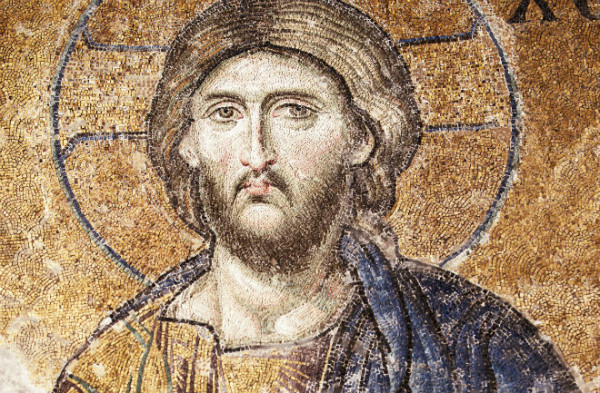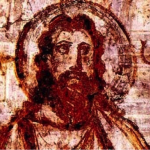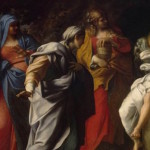An Atheist Historian Examines the Evidence for Jesus (Part 2 of 2)
by Tim O'Neill
Filed under Historicity
NOTE: This it the second of a two part series. Before reading this be sure to check out Part 1.
Many Christians accept that a historical Jesus existed because they never thought to question the idea in the first place, or because they are convinced that the gospels can be read as (more or less) historical accounts and so don't need to be seriously doubted on this point. But why do the overwhelming majority of non-Christian scholars also accept that Jesus existed?
The Total Lack of Evidence for a "Mythic Christianity"
Essentially, it's because it's the most parsimonious explanation of the evidence we have. Early Christianity and the critics of early Christianity agree on virtually nothing about Jesus, except for one thing - that he existed as a historical person in the early first century. If there really was an original form of Christianity that didn't believe this, as all versions of the "Jesus Myth" idea require, then it makes no sense that there is no trace of it. Such an idea would be a boon to the various Gnostic branches of Christianity, which emphasized his spiritual/mystical aspects and saw him as an emissary from a purely spiritual world who aimed to help us escape the physical dimension. A totally non-historical, purely mystical Jesus would have suited their purposes perfectly. Yet they never taught such a Jesus existed - they always depict him as a historical, first century teacher, but argued that he was "pure spirit" and only had the "illusion of flesh". Why? Because they couldn't deny that he had existed as a historical person and there was no prior "mythic Jesus" tradition for them to draw on.
Similarly, the memory of an earlier, original Christianity which didn't believe in a historical Jesus would have been a killer argument for the many Jewish and pagan critics of Christianity. Jesus Mythicists claim this mythic Jesus Christianity survived well into the second or even third century. We have orthodox Christian responses to critiques by Jews and pagans from that period, by Justin Martyr, Origen, and Minucius Felix. They try to confront and answer the arguments their critics make about Jesus - that he was a fool, a magician, a bastard son of a Roman soldier, a fraud etc - but none of these apologetic works so much as hint that anyone ever claimed he never existed. If a whole branch of Christianity existed that claimed just this, why did it pass totally unnoticed by these critics? Clearly no such earlier "mythic Jesus" proto-Christianity existed - it is a creation of the modern Jesus Mythicist activists to prop up their theory.
Indicators of Historicity in the Gospels
The main reason non-Christian scholars accept that there was a Jewish preacher as the point of origin of the Jesus story is that the stories themselves contain elements that only make sense if they were originally about such a preacher, but which the gospel writers themselves found somewhat awkward. As noted above, far from conforming closely to expectations about the coming Messiah, the Jesus story actually shows many signs of being shoehorned into such expectations and not exactly fitting very well.
For example, in the Gospel of Mark, Jesus is depicted as going to the Jordan and being baptized by John the Baptist (Mark 1: 9-11), after which he hears a voice from heaven and goes off into the wilderness to fast. For the writer of Mark, this is the point where Jesus becomes the Messiah of Yahweh and so there is no problem with him having his sins washed away by John, since prior to his point he was man like any other. The writer of the Gospel of Matthew, however, has a very different Christology. In his version, Jesus has been the ordained Messiah since his miraculous conception, so it is awkward for him to have the chosen one of God going to be baptized by John, who is a lesser prophet. So Matthew tells more or less the same story as he finds in Mark, which he uses as his source, but adds a small exchange of dialogue not found in the earlier version:
"But John tried to deter him, saying, “I need to be baptized by you, and do you come to me?” Jesus replied, "Let it be so now; it is proper for us to do this to fulfill all righteousness." Then John consented." (Matt 3:14-15)
When we turn to the latest of the gospels, the Gospel of John, we find a very different story again. The writer of this gospel depicts Jesus as being a mystical, pre-existent Messiah who had a heavenly existence since the beginning of time. So for him the idea of Jesus being baptized by John is even more awkward. He solves the problem by removing the baptism altogether. In this latest version, John is baptizing other people and telling them that the Messiah was to come and then sees Jesus and declares him to be the Messiah (John 1:29-33). There is no baptism of Jesus at all in the Gospel of John version.
So in these three examples we have three different versions of the same story written at three times in the early decades of Christianity. All of them are dealing with the baptism of Jesus by John in different ways and trying to make it fit with their conceptions of Jesus and at least two of them are having some trouble doing so and are having to change the story to make it fit their ideas about Jesus. All this indicates that the baptism of Jesus by John was a historical event and known to be such and so could not be left out of the story. This left the later gospel writers with the problem of trying to make it fit their evolving ideas about who and what Jesus was.
There are several other elements in the gospels like this. The Gospels of Luke and Matthew go to great lengths to tell stories which "explain" how Jesus came to be born in Bethlehem despite being from Nazareth, since Micah 5:2 was taken to be a prophecy that the Messiah was to be from Bethlehem. Both gospels, however, tell completely different, totally contradictory and mutually exclusive stories (one is even set ten years after the other) which all but the most conservative Christian scholars acknowledge to be non-historical. The question then arises: why did they go to this effort? If Jesus existed and was from Nazareth, this makes sense. Clearly some Jews objected to the claim Jesus was the Messiah on the grounds that he was from the insignificant village of Nazareth in Galilee and not from Bethlehem in Judea - John 7:41-42 even depicts some Jews making precisely this objection. So it makes sense that Christian traditions would arise that "explain" how a man known to be a Galilean from Nazareth came to be born in Bethlehem and raised in Nazareth - thus the contradictory stories in the Gospels of Luke and Matthew that have this as their end.
If, however, there was no historical Jesus then it is very hard to explain why an insignificant town like Nazareth is in the story at all. If Jesus was a purely mythic figure and the stories of his life evolved out of expectations about the Messiah then he would be from Bethlehem, as was expected as a Messiah. So why is Nazareth, a tiny place of no religious significance, in the story? And why all the effort to get Jesus born in Bethlehem but keep Nazareth in the narrative? The only reasonable explanation is that Nazareth is the historical element in these accounts - it is in the story because that is where Jesus was from. A historical Jesus explains the evidence far better than any "mythic" alternative.
But probably the best example of an element in the story which was so awkward for the early Christians that it simply has to be historical is the crucifixion. The idea of a Messiah who dies was totally unheard of and utterly alien to any Jewish tradition prior to the beginning of Christianity, but the idea of a Messiah who was crucified was not only bizarre, it was absurd. According to Jewish tradition, anyone who was "hanged on a tree" was to be considered accursed by Yahweh and this was one of the reasons crucifixion was considered particularly abhorrent to Jews. The concept of a crucified Messiah, therefore, was totally bizarre and absurd.
It was equally weird to non-Jews. Crucifixion was considered the most shameful of deaths, so much so that one of the privileges of Roman citizenship is that citizens could never be crucified. The idea of a crucified god, therefore, was unthinkable. This was so much the case that the early Christians avoided any depictions of Jesus on the cross - the first depictions of the Crucifixion appear in the Fourth Century, after Christian emperors banned crucifixion and it began to lose its stigma. It's significant that the earliest depiction of the crucifixion of Jesus that we have is a graffito from Rome showing a man worshipping a crucified figure with the head of a donkey with the mocking caption "Alexamenos worships his god". The idea of a crucified god was, quite literally, ridiculous. Paul acknowledges how absurd the idea of a crucified Messiah was in 1 Corinthians 1:23, where he says it "is a stumbling block to the Jews and an absurdity to the gentiles".
The accounts of Jesus' crucifixion in the gospels also show how awkward the nature of their Messiah's death was for the earliest Christians. They are all full of references to texts in the Old Testament as ways of demonstrating that, far from being an absurdity, this was what was supposed to happen to the Messiah. But none of the texts used were considered prophecies of the Messiah before Christianity came along and some of them are highly forced. The "suffering servant" passages in Isaiah 53 are pressed into service as "prophecies" of the crucifixion, since they depict a figure being falsely accused, rejected and given up to be "pierced .... as a guilt offering". But the gospels don't reference other parts of the same passage which don't fit their story at all, such as where it is said this figure will "prolong his days and look upon his offspring".
Clearly the gospel writers were going to some effort to find some kind of scriptural basis for this rather awkward death for their group's leader, one that let them maintain their belief that he was the Messiah. Again, this makes most sense if there was a historical Jesus and he was crucified, leaving his followers with this awkward problem. If there was no historical Jesus at all, it becomes very difficult to explain where this bizarre, unprecedented and awkwardly inconvenient element in the story comes from. It's hard to see why anyone would invent the idea of a crucified Messiah and create these problems. And given that there was no precedent for a crucified Messiah, it's almost impossible to see this idea evolving out of earlier Jewish traditions. The most logical explanation is that it's in the story, despite its vast awkwardness, because it happened.
Non-Christian References to Jesus as a Historical Figure
Many Christian apologists vastly overstate the number of ancient, non-Christian writers who attest to the existence of Jesus. This is partly because they are not simply showing that a mere Jewish preacher existed, but are arguing for the existence of the "Jesus Christ" of Christian doctrine: a supposedly supernatural figure who allegedly performed amazing public miracles in front of audiences of thousands of witnesses. It could certainly be argued that such a wondrous figure would have been noticed outside of Galilee and Judea and so should have been widely noted as well. So Christian apologists often cite a long list of writers who mention Jesus, usually including Josephus, Pliny the Younger, Tacitus, Suetonius, Lucian, Thallus and several others. But of these only Tacitus and Josephus actually mention Jesus as a historical person - the others are all simply references to early Christianity, some of which mention the "Christ" that was the focus of its worship.
If we are simply noting the existence of Jesus as a human Jewish preacher, we are not required to produce more mentions of him than we would expect of comparable figures. And what we find is that we have about as much evidence for his existence (outside any Christian writings) as we have for other Jewish preachers, prophets, and Messianic claimants of the time. The two non-Christian writers who mention him as a historical person are Josephus and Tacitus.
Josephus
The Jewish priestly aristocrat Joseph ben Matityahu, who took the Roman name Flavius Josephus, is our main source of information about Jewish affairs in this period and is usually the only writer of the time who makes any mention of Jewish preachers, prophets, and Messianic claimants of the first century. Not surprisingly, he mentions Jesus twice: firstly in some detail in Antiquities of the Jews XVIII.3.4 and again more briefly when mentioning the execution of Jesus' brother James in Antiquities XX.9.1. The first reference is problematic, however, as it contains elements which Josephus cannot have written and which seem to have been added later by a Christian interpolator. Here is the text, with the likely interpolations in bold:
"Now there was about this time Jesus, a wise man, if it be lawful to call him a man; for he was a doer of paradoxical deeds, a teacher of such men as receive the truth with pleasure. He drew over to him both many of the Jews and many of the Gentiles. He was [the] Christ And when Pilate at the suggestion of the principal men amongst us, had condemned him to the cross, those that loved him at the first did not forsake him; for he appeared to them alive again the third day; as the divine prophets had foretold these and ten thousand other wonderful things concerning him. And the tribe of Christians, so named from him, are not extinct at this day."
There has been a long debate about what parts of this reference to Jesus are authentic to Josephus or even if the whole passage is a wholesale interpolation. Proponents of the Jesus Myth hypothesis, naturally, opt for the idea that it is not authentic in any way, but there are strong indications that, apart from the obvious additions shown in bold above, Josephus did mention Jesus at this point in his text.
To begin with, several elements in the passage are distinctively Josephan in their style and phrasing. "Now (there was) about this time ..." is used by Josephus as a way of introducing a new topic hundreds of times in his work. There are no early Christian parallels that refer to Jesus merely as "a wise man", but this is a term used by Josephus several times, e.g., about Solomon and Daniel. Christian writers placed a lot of emphasis on Jesus' miracles, but here the passage uses a fairly neutral term παραδόξων ἔργων - "paradoxa erga" or "paradoxical deeds". Josephus does use this phrase elsewhere about the miracles of Elisha, but the term can also mean "deeds that are difficult to interpret" and even has overtones of cautious skepticism. Finally, the use of the word φῦλον ("phylon" - "race, tribe") is not used by Christians about themselves in any works of the time, but is used by Josephus elsewhere about nations or other distinct groups. Additionally, with the sole exception of Χριστιανῶν ("Christianon" - "Christians") every single word in the passage can be found elsewhere in Josephus' writings.
The weight of the evidence of the vocabulary and style of the passage is heavily towards its partial authenticity. Not only does it contain distinctive phrases of Josephus that he used in similar contexts elsewhere, but these are also phrases not found in early Christian texts. And it is significantly free of terms and phrases from the gospels, which we'd expect to find if it was created wholesale by a Christian writer. So either a very clever Christian interpolator somehow managed to immerse himself in Josephus' phrasing and language, without modern concordances and dictionaries, and create a passage containing distinctively Josephean phraseology, or what we have here is a genuinely Josephean passage that has simply been added to rather clumsily.
As a result of this and other evidence (e.g., the Arabic and Syriac paraphrases of this passage which seem to come from a version before the clumsy additions by the interpolator) the consensus amongst scholars of all backgrounds is that the passage is partially genuine, with additions made in a few obvious places. Louis H. Feldman's Josephus and Modern Scholarship (1984) surveys scholarship on the question from 1937 to 1980 and finds of 52 scholars on the subject, 39 considered the passage to be partially authentic.
Peter Kirby has since done a survey of the literature and found that this trend has increased in recent years. He concludes "In my own reading of thirteen books since 1980 that touch upon the passage, ten out of thirteen argue the (Antiquities of the Jews XVIII.3.4 passage) to be partly genuine, while the other three maintain it to be entirely spurious. Coincidentally, the same three books also argue that Jesus did not exist."
The other mention of Jesus in Josephus, Antiquities XX.9.1, is much more straightforward, and much more of a problem for Jesus Mythicists. In it Josephus recounts a major political event that happened when he was a young man. This would have been a significant and memorable event for him, since he was only 25 at the time and it caused upheaval in his own social and political class, the priestly families of Jerusalem that included his own.
In 62 AD the Roman procurator of Judea, Porcius Festus, died while in office and his replacement, Lucceius Albinus, was still on his way to Judea from Rome. This left the High Priest, Hanan ben Hanan (usually called Ananus), with a freer reign than usual. Ananus executed some Jews without Roman permission and, when this was brought to the attention of the Romans, Ananus was deposed. This deposition would have been memorable for the young Josephus, who had just returned from an embassy to Rome on the behalf of the Jerusalem priests. But what makes this passage relevant is what Josephus mentions, in passing, as the cause of the political upheaval:
"Festus was now dead, and Albinus was but upon the road; so (the High Priest) assembled the Sanhedrin of judges, and brought before them the brother of Jesus, who was called Messiah, whose name was James, and some others; and when he had formed an accusation against them as breakers of the law, he delivered them to be stoned."
This mention is peripheral to the story Josephus is telling, but since we know from Christian sources that Jesus' brother James led the Jesus sect in Jerusalem in this period, and we have a separate, non-dependent, Christian account of James' execution by the Jerusalem priesthood, it is fairly clear which "Jesus who was called Messiah" Josephus is referring to here.
Almost without exception, modern scholars consider this passage genuine and an undisputed reference to Jesus as a historical figure by someone who was a contemporary of his brother and who knew of the execution of that brother first hand. This rather unequivocal reference to a historical Jesus leaves Jesus Mythicists with a thorny problem, which they generally try to solve one of two ways. They either claim:
(i) "The words "who was called Messiah" are a later Christian interpolation"
Since it is wholly unlikely that a Christian interpolator invented the whole story of the deposition of the High Priest just to slip in this passing reference to Jesus, Mythicists try to argue that the key words which identify which Jesus is being spoken of are interpolated. Unfortunately this argument does not work. This is because the passage is discussed no less than three times in mid-third century works by the Christian apologist Origen and he directly quotes the relevant section with the words "Jesus who was called the Messiah" all three times: in Contra Celsum I.4, in Contra Celsum II:13 and in Commentarium in evangelium Matthaei X.17. Each time he uses precisely the phrase we find in Josephus: αδελφος Ιησου του λεγομενου Χριστου ("the brother of that Jesus who was called Messiah"). This is significant because Origen was writing a whole generation before Christianity was in any kind of position to be tampering with texts of Josephus. If this phrase was in the passage in Origen's time, then it was clearly original to Josephus.
(ii) "The Jesus being referred to here was not the Jesus of Christianity, but the 'Jesus, son of Dameus' mentioned later in the same passage."
After detailing the deposition of the High Priest Ananus, Josephus mentions that he was succeeded as High Priest by a certain "Jesus, son of Damneus". So Mythicists try to argue that this was the Jesus that Josephus was talking about earlier, since Jesus was a very common name. It certainly was, but we know how Josephus was careful to differentiate between different people with the same common first name. So it makes more sense that he calls one "Jesus who was called Messiah" and the other "Jesus son of Damneus" to do precisely this. Nowhere else does he call the same person two different things in the same passage, as the Mythicist argument requires. And he certainly would not do so without making it clear that the Jesus who was made High Priest was the same he had mentioned earlier, which he does not do.
The idea that the Jesus referred to as the brother of James was the later mentioned "Jesus son of Damneus" is further undercut by the narrative in the rest of Book XX. In it the former high priest Ananus continues to play politics and curries favour with the Roman procurator Albinus and the new high priest by giving them rich presents. This makes no sense if Jesus the brother of the executed James was also "Jesus the son of Damneus", since the new high priest in question is the same Jesus ben Damneus - the idea that he would become friends with his brother's killer just because he was given some nice gifts is ridiculous.
Mythicists are also still stuck with the phrase "who was called Messiah", which Origen's mentions show can't be dismissed as an interpolation. They usually attempt to argue that, as a High Priest, Jesus the son of Damenus would have been "called Messiah" because "Messiah" means 'anointed" and priests were anointed with oil at their elevation. Since there are no actual examples of any priests being referred to this way, this is another ad hoc argument designed merely to get the Mythicist argument off the hook.
So the consensus of scholars, Christian and non-Christian, is that the Antiquities XVIII.3.4 passage is authentic despite some obvious later additions and the Antiquities XX.9.1 passage is wholly authentic. These references alone give us about as much evidence for the existence of a historical "Jesus, who was called Messiah" as we have for comparable Jewish preachers and prophets and is actually sufficient to confirm his existence with reference to any gospel or Christian source.
Tacitus
The mention of Jesus in the Annals of the aristocratic Roman historian and senator Publius Cornelius Tacitus is significant partly because of his status as one of the most careful and skeptical historians of the ancient world and partly because it comes from someone who is obviously a hostile witness. Tacitus absolutely despised Christianity, as he make clear when he mentions how the emperor Nero tried to scapegoat them after the Great Fire of Rome in 64 AD. He also gives an account to his readers as the origin of the Christian sect and their founder in Judea:
"Consequently, to get rid of the report, Nero fastened the guilt and inflicted the most exquisite tortures on a class hated for their abominations, called Christians by the populace. Christus, from whom the name had its origin, suffered the extreme penalty during the reign of Tiberius at the hands of one of our procurators, Pontius Pilatus, and a most mischievous superstition, thus checked for the moment, again broke out not only in Judæa, the first source of the evil, but even in Rome, where all things hideous and shameful from every part of the world find their center and become popular." (Tacitus, Annals, XV.44)
Again, this clear reference to Jesus, complete with the details of his execution by Pilate, is a major problem for the Mythicists. They sometimes try to deal with it using their old standby argument: a claim that it is a later interpolation. But this passage is distinctively Tacitean in its language and style and it is hard to see how a later Christian scribe could have managed to affect perfect second century Latin grammar and an authentic Tacitean style and fool about 400 years worth of Tacitus scholars, who all regard this passage and clearly genuine.
A more common way of dismissing this passage is to claim that all Tacitus is doing is repeating what Christians had told him about their founder and so it is not independent testimony for Jesus at all. This is slightly more feasible, but still fails on several fronts.
Firstly, Tacitus made a point of not using hearsay, of referring to sources or people whose testimony he trusted and of noting mere rumour, gossip or second-hand reports as such when he could. He was explicit in his rejection of history based on hearsay earlier in his work:
"My object in mentioning and refuting this story is, by a conspicuous example, to put down hearsay, and to request that all those into whose hands my work shall come not to catch eagerly at wild and improbable rumours in preference to genuine history." (Tacitus, Annals, IV.11)
Secondly, if Tacitus were to break his own rule and accept hearsay about the founder of Christianity, then it's highly unlikely that he would do so from Christians themselves (if this aristocrat even had any contact with any), who he regarded with utter contempt. He calls Christianity "a most mischievous superstition...evil...hideous and shameful...(with a) hatred against mankind" - not exactly the words of a man who regarded its followers as reliable sources about their sect's founder.
Furthermore, what he says about Jesus does not show any sign of having its origin in what a Christian would say: it has no hint or mention of Jesus' teaching, or his miracles, or anything about the claim that he rose from the dead. On the other hand, it does contain elements that would have been of note to a Roman or other non-Christian: that this founder was executed, where this happened, when it occurred ("during the reign of Tiberius") and which Roman governor carried out the penalty.
We know from earlier in the same passage that Tacitus consulted several (unnamed) earlier sources when writing his account of the aftermath of the Great Fire (see Annals XV.38), so it may have been one of these that gave him his information about Jesus. But there was someone else in Rome at the time Tacitus wrote who mixed in the same circles, who was also a historian and who would have been the obvious person for Tacitus to ask about obscure Jewish preachers and their sects. None other than Josephus was living and writing in Rome at this time and, like Tacitus, associated with the Imperial court thanks to his patronage first by the emperor Vespasian and then by his son and successor Titus. There is a strong correspondence between the details about Jesus in Annals XV.44 and Antiquities XVIII.3.4, so it is at least plausible that Tacitus simply asked his fellow aristocratic scholar about the origins of this Jewish sect.
Conclusion
The original question we concerned ourselves with was whether historians regard the existence of Jesus to be "historical fact". The answer is that they do as much as any scholar can do so for the existence of an obscure peasant preacher in the ancient world. There is as much, if not slightly more, evidence for the existence of Yeshua ben Yusef as there is for other comparable Jewish preachers, prophets, and Messianic claimants, even without looking at the gospel material. Additionally, that material contains elements which only make sense if their stories are about a historical figure.
The arguments of the Jesus Mythicists, on the other hand, require contortions and suppositions that simply do not stand up to Occam's Razor and continually rest on positions that are not accepted by the majority of even non-Christian and Jewish scholars. The proponents of the Jesus Myth hypothesis are almost exclusively amateurs with an ideological axe to grind and their position is and will almost certainly remain on the outer fringe of theories about the origins of Christianity.
Related Posts
Note: Our goal is to cultivate serious and respectful dialogue. While it's OK to disagree—even encouraged!—any snarky, offensive, or off-topic comments will be deleted. Before commenting please read the Commenting Rules and Tips. If you're having trouble commenting, read the Commenting Instructions.













